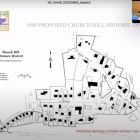Footer Featured Widget
Preservationists Seek To Establish ‘Church Hill Historic District’ in New Canaan
|
Local preservationists are seeking to create an expanded historic district in New Canaan. The town’s current Historic District, created in 1963, includes 21 structures around God’s Acre.
Under a proposal made public Tuesday by members of the New Canaan Preservation Alliance, the “Church Hill Historic District” would also encompass Vine Cottage and qualifying homes on Seminary Street and St. John Place, as well as additional structures on Main Street, according to a presentation by Neele Stichnoth and Lea Cromwell, president and vice president, respectively, of the NCPA board. The district would be “much more expanded and it will offer tremendous protection to local residents, now that we know that a third of an acre can wind up with a 20-unit development on it,” Stichnoth told members of the Board of Selectmen during their regular meeting, held at Town Hall and via videoconference. She referred to an 8-30g affordable housing proposal, now before the Planning & Zoning Commission, at the former Red Cross building at 51 Main St.

